Analysis of Factors Affecting Organic Food Success in India Market
VerifiedAdded on 2023/06/10
|11
|2614
|372
Report
AI Summary
This report provides a comprehensive market research analysis of the factors influencing the success of organic food in India. It begins with an introduction and outlines the research problem, which includes the high cost, limited availability, and lack of trust associated with organic food. A literature review explores existing research on the topic, highlighting factors such as increasing sales, high-quality production free from contaminants, and the impact of rainfall and farming practices. The report defines key variables, including independent variables like farmers and stakeholders and dependent variables like rainfall and food quality. The research methodology includes a descriptive research design, with a focus on probability and non-probability sampling methods. The report includes a questionnaire designed to gather demographic data and assess consumer attitudes. Data analysis methods involve both qualitative and quantitative techniques, including the use of bar diagrams, pie charts, and column charts, as well as hypothesis testing. The conclusion summarizes the key findings and implications of the research, offering insights into the future of organic food in the Indian market. The report highlights the importance of consumer behavior, sustainable agriculture, and market trends in the success of organic food in India.

Market
Research
Research
Paraphrase This Document
Need a fresh take? Get an instant paraphrase of this document with our AI Paraphraser
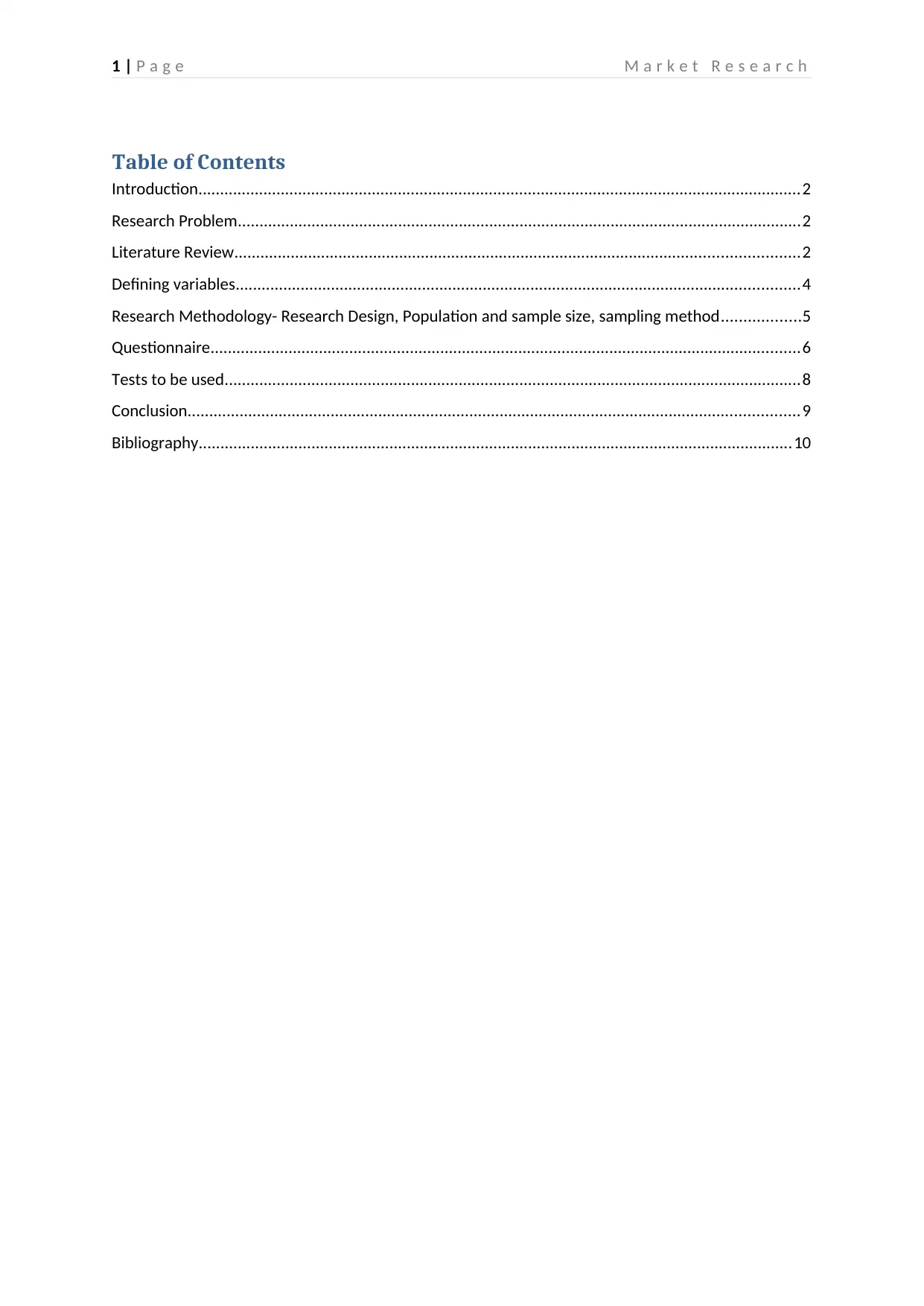
1 | P a g e M a r k e t R e s e a r c h
Table of Contents
Introduction...........................................................................................................................................2
Research Problem..................................................................................................................................2
Literature Review..................................................................................................................................2
Defining variables..................................................................................................................................4
Research Methodology- Research Design, Population and sample size, sampling method..................5
Questionnaire........................................................................................................................................6
Tests to be used.....................................................................................................................................8
Conclusion.............................................................................................................................................9
Bibliography.........................................................................................................................................10
Table of Contents
Introduction...........................................................................................................................................2
Research Problem..................................................................................................................................2
Literature Review..................................................................................................................................2
Defining variables..................................................................................................................................4
Research Methodology- Research Design, Population and sample size, sampling method..................5
Questionnaire........................................................................................................................................6
Tests to be used.....................................................................................................................................8
Conclusion.............................................................................................................................................9
Bibliography.........................................................................................................................................10
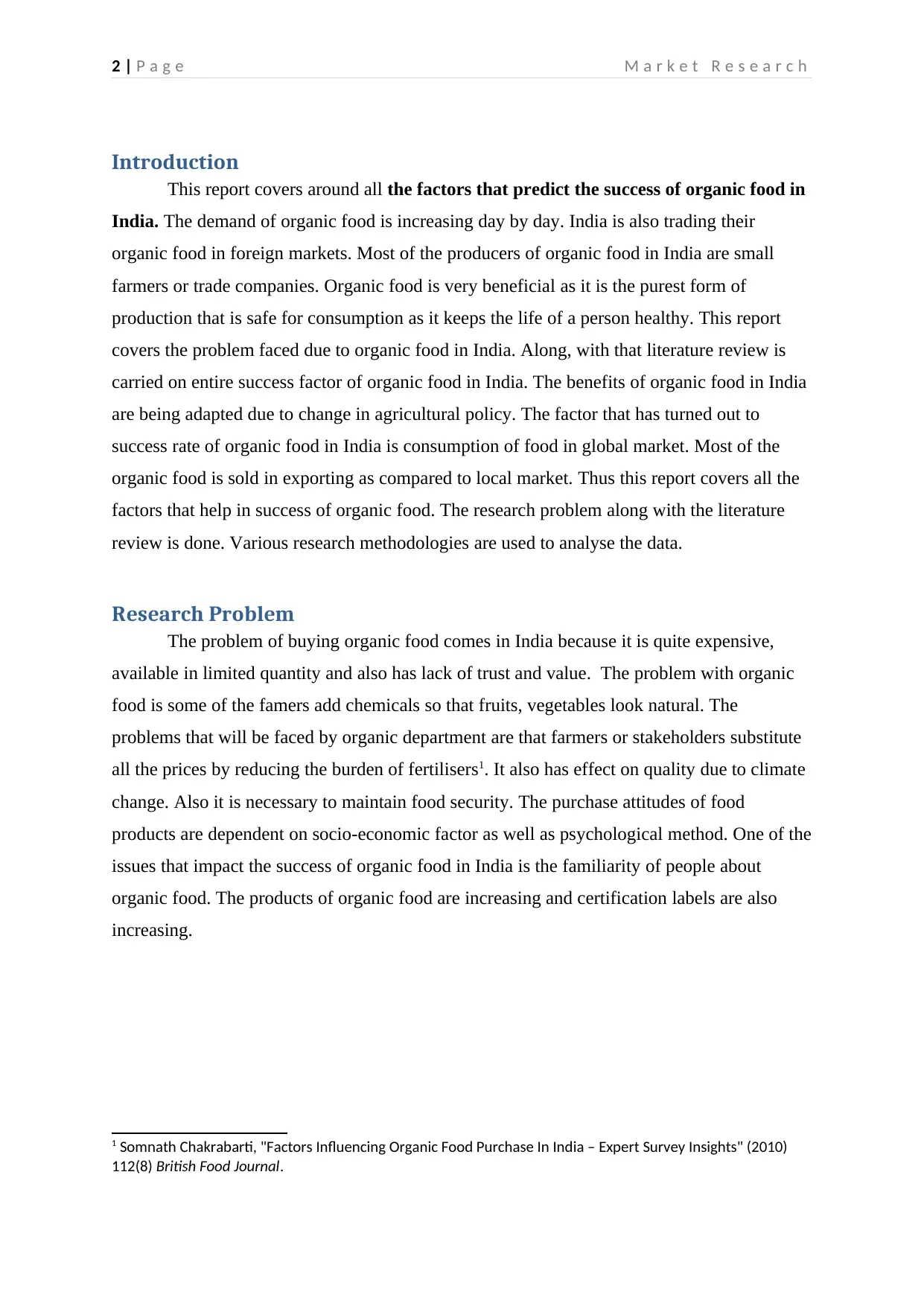
2 | P a g e M a r k e t R e s e a r c h
Introduction
This report covers around all the factors that predict the success of organic food in
India. The demand of organic food is increasing day by day. India is also trading their
organic food in foreign markets. Most of the producers of organic food in India are small
farmers or trade companies. Organic food is very beneficial as it is the purest form of
production that is safe for consumption as it keeps the life of a person healthy. This report
covers the problem faced due to organic food in India. Along, with that literature review is
carried on entire success factor of organic food in India. The benefits of organic food in India
are being adapted due to change in agricultural policy. The factor that has turned out to
success rate of organic food in India is consumption of food in global market. Most of the
organic food is sold in exporting as compared to local market. Thus this report covers all the
factors that help in success of organic food. The research problem along with the literature
review is done. Various research methodologies are used to analyse the data.
Research Problem
The problem of buying organic food comes in India because it is quite expensive,
available in limited quantity and also has lack of trust and value. The problem with organic
food is some of the famers add chemicals so that fruits, vegetables look natural. The
problems that will be faced by organic department are that farmers or stakeholders substitute
all the prices by reducing the burden of fertilisers1. It also has effect on quality due to climate
change. Also it is necessary to maintain food security. The purchase attitudes of food
products are dependent on socio-economic factor as well as psychological method. One of the
issues that impact the success of organic food in India is the familiarity of people about
organic food. The products of organic food are increasing and certification labels are also
increasing.
1 Somnath Chakrabarti, "Factors Influencing Organic Food Purchase In India – Expert Survey Insights" (2010)
112(8) British Food Journal.
Introduction
This report covers around all the factors that predict the success of organic food in
India. The demand of organic food is increasing day by day. India is also trading their
organic food in foreign markets. Most of the producers of organic food in India are small
farmers or trade companies. Organic food is very beneficial as it is the purest form of
production that is safe for consumption as it keeps the life of a person healthy. This report
covers the problem faced due to organic food in India. Along, with that literature review is
carried on entire success factor of organic food in India. The benefits of organic food in India
are being adapted due to change in agricultural policy. The factor that has turned out to
success rate of organic food in India is consumption of food in global market. Most of the
organic food is sold in exporting as compared to local market. Thus this report covers all the
factors that help in success of organic food. The research problem along with the literature
review is done. Various research methodologies are used to analyse the data.
Research Problem
The problem of buying organic food comes in India because it is quite expensive,
available in limited quantity and also has lack of trust and value. The problem with organic
food is some of the famers add chemicals so that fruits, vegetables look natural. The
problems that will be faced by organic department are that farmers or stakeholders substitute
all the prices by reducing the burden of fertilisers1. It also has effect on quality due to climate
change. Also it is necessary to maintain food security. The purchase attitudes of food
products are dependent on socio-economic factor as well as psychological method. One of the
issues that impact the success of organic food in India is the familiarity of people about
organic food. The products of organic food are increasing and certification labels are also
increasing.
1 Somnath Chakrabarti, "Factors Influencing Organic Food Purchase In India – Expert Survey Insights" (2010)
112(8) British Food Journal.
⊘ This is a preview!⊘
Do you want full access?
Subscribe today to unlock all pages.

Trusted by 1+ million students worldwide
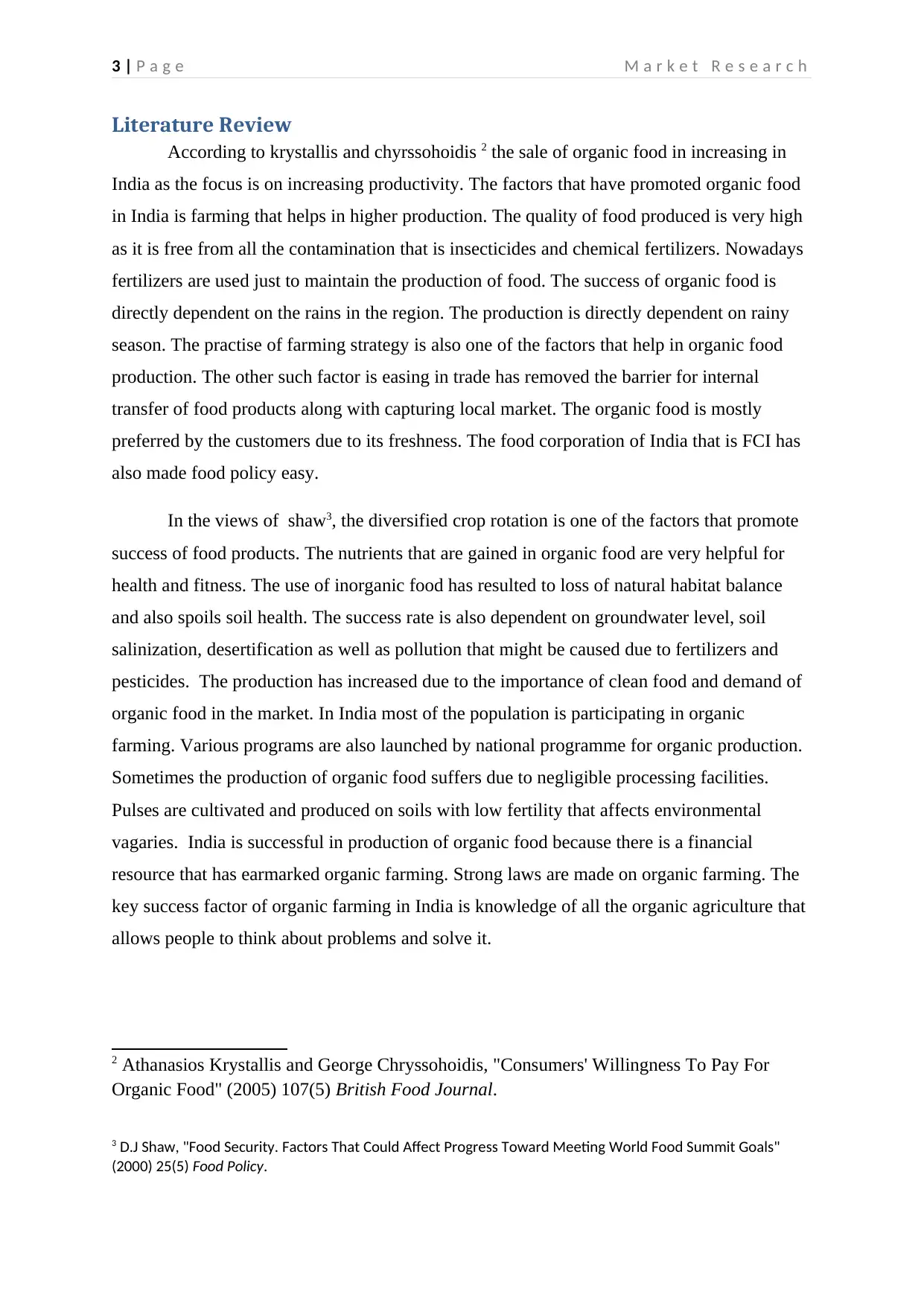
3 | P a g e M a r k e t R e s e a r c h
Literature Review
According to krystallis and chyrssohoidis 2 the sale of organic food in increasing in
India as the focus is on increasing productivity. The factors that have promoted organic food
in India is farming that helps in higher production. The quality of food produced is very high
as it is free from all the contamination that is insecticides and chemical fertilizers. Nowadays
fertilizers are used just to maintain the production of food. The success of organic food is
directly dependent on the rains in the region. The production is directly dependent on rainy
season. The practise of farming strategy is also one of the factors that help in organic food
production. The other such factor is easing in trade has removed the barrier for internal
transfer of food products along with capturing local market. The organic food is mostly
preferred by the customers due to its freshness. The food corporation of India that is FCI has
also made food policy easy.
In the views of shaw3, the diversified crop rotation is one of the factors that promote
success of food products. The nutrients that are gained in organic food are very helpful for
health and fitness. The use of inorganic food has resulted to loss of natural habitat balance
and also spoils soil health. The success rate is also dependent on groundwater level, soil
salinization, desertification as well as pollution that might be caused due to fertilizers and
pesticides. The production has increased due to the importance of clean food and demand of
organic food in the market. In India most of the population is participating in organic
farming. Various programs are also launched by national programme for organic production.
Sometimes the production of organic food suffers due to negligible processing facilities.
Pulses are cultivated and produced on soils with low fertility that affects environmental
vagaries. India is successful in production of organic food because there is a financial
resource that has earmarked organic farming. Strong laws are made on organic farming. The
key success factor of organic farming in India is knowledge of all the organic agriculture that
allows people to think about problems and solve it.
2 Athanasios Krystallis and George Chryssohoidis, "Consumers' Willingness To Pay For
Organic Food" (2005) 107(5) British Food Journal.
3 D.J Shaw, "Food Security. Factors That Could Affect Progress Toward Meeting World Food Summit Goals"
(2000) 25(5) Food Policy.
Literature Review
According to krystallis and chyrssohoidis 2 the sale of organic food in increasing in
India as the focus is on increasing productivity. The factors that have promoted organic food
in India is farming that helps in higher production. The quality of food produced is very high
as it is free from all the contamination that is insecticides and chemical fertilizers. Nowadays
fertilizers are used just to maintain the production of food. The success of organic food is
directly dependent on the rains in the region. The production is directly dependent on rainy
season. The practise of farming strategy is also one of the factors that help in organic food
production. The other such factor is easing in trade has removed the barrier for internal
transfer of food products along with capturing local market. The organic food is mostly
preferred by the customers due to its freshness. The food corporation of India that is FCI has
also made food policy easy.
In the views of shaw3, the diversified crop rotation is one of the factors that promote
success of food products. The nutrients that are gained in organic food are very helpful for
health and fitness. The use of inorganic food has resulted to loss of natural habitat balance
and also spoils soil health. The success rate is also dependent on groundwater level, soil
salinization, desertification as well as pollution that might be caused due to fertilizers and
pesticides. The production has increased due to the importance of clean food and demand of
organic food in the market. In India most of the population is participating in organic
farming. Various programs are also launched by national programme for organic production.
Sometimes the production of organic food suffers due to negligible processing facilities.
Pulses are cultivated and produced on soils with low fertility that affects environmental
vagaries. India is successful in production of organic food because there is a financial
resource that has earmarked organic farming. Strong laws are made on organic farming. The
key success factor of organic farming in India is knowledge of all the organic agriculture that
allows people to think about problems and solve it.
2 Athanasios Krystallis and George Chryssohoidis, "Consumers' Willingness To Pay For
Organic Food" (2005) 107(5) British Food Journal.
3 D.J Shaw, "Food Security. Factors That Could Affect Progress Toward Meeting World Food Summit Goals"
(2000) 25(5) Food Policy.
Paraphrase This Document
Need a fresh take? Get an instant paraphrase of this document with our AI Paraphraser
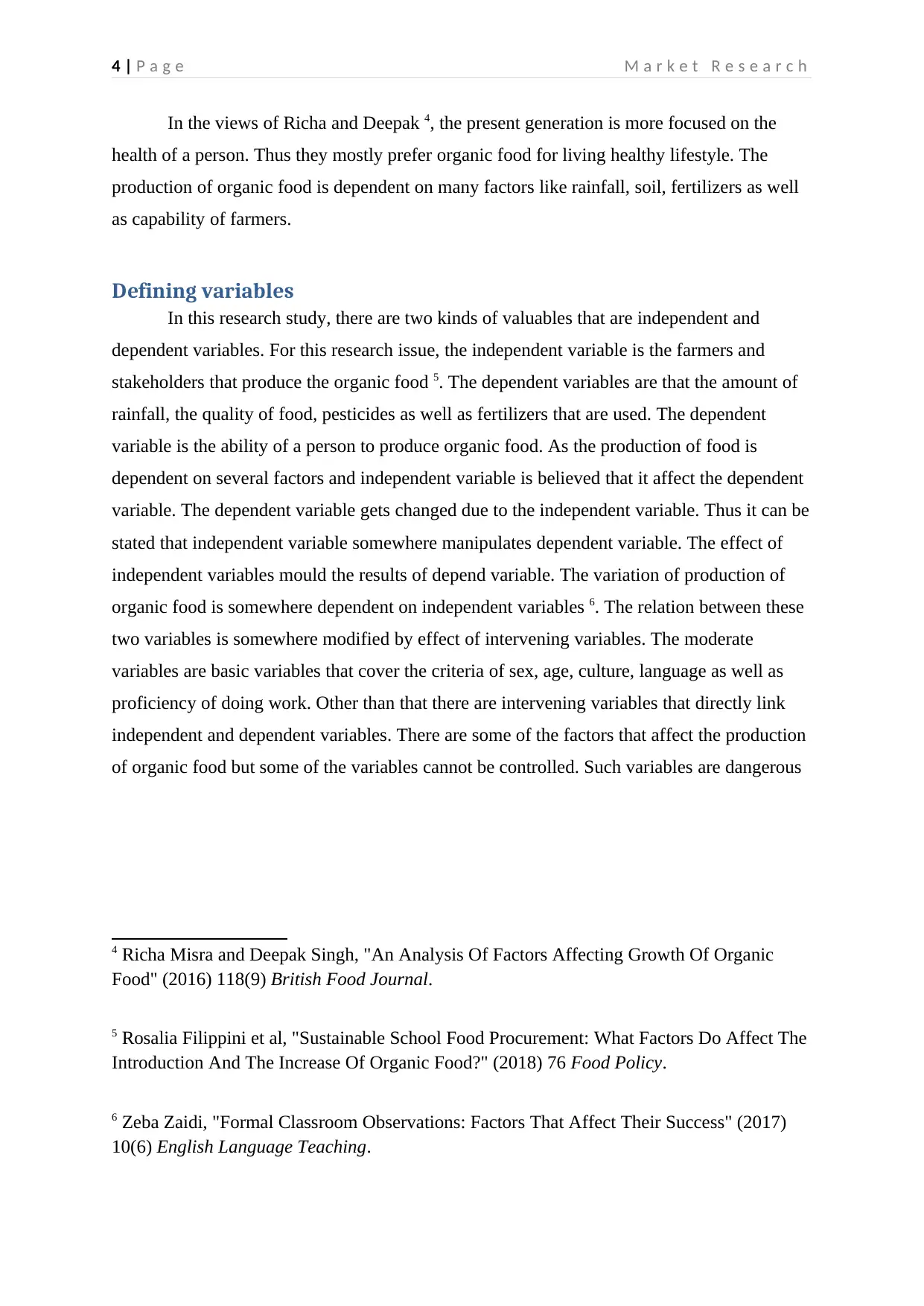
4 | P a g e M a r k e t R e s e a r c h
In the views of Richa and Deepak 4, the present generation is more focused on the
health of a person. Thus they mostly prefer organic food for living healthy lifestyle. The
production of organic food is dependent on many factors like rainfall, soil, fertilizers as well
as capability of farmers.
Defining variables
In this research study, there are two kinds of valuables that are independent and
dependent variables. For this research issue, the independent variable is the farmers and
stakeholders that produce the organic food 5. The dependent variables are that the amount of
rainfall, the quality of food, pesticides as well as fertilizers that are used. The dependent
variable is the ability of a person to produce organic food. As the production of food is
dependent on several factors and independent variable is believed that it affect the dependent
variable. The dependent variable gets changed due to the independent variable. Thus it can be
stated that independent variable somewhere manipulates dependent variable. The effect of
independent variables mould the results of depend variable. The variation of production of
organic food is somewhere dependent on independent variables 6. The relation between these
two variables is somewhere modified by effect of intervening variables. The moderate
variables are basic variables that cover the criteria of sex, age, culture, language as well as
proficiency of doing work. Other than that there are intervening variables that directly link
independent and dependent variables. There are some of the factors that affect the production
of organic food but some of the variables cannot be controlled. Such variables are dangerous
4 Richa Misra and Deepak Singh, "An Analysis Of Factors Affecting Growth Of Organic
Food" (2016) 118(9) British Food Journal.
5 Rosalia Filippini et al, "Sustainable School Food Procurement: What Factors Do Affect The
Introduction And The Increase Of Organic Food?" (2018) 76 Food Policy.
6 Zeba Zaidi, "Formal Classroom Observations: Factors That Affect Their Success" (2017)
10(6) English Language Teaching.
In the views of Richa and Deepak 4, the present generation is more focused on the
health of a person. Thus they mostly prefer organic food for living healthy lifestyle. The
production of organic food is dependent on many factors like rainfall, soil, fertilizers as well
as capability of farmers.
Defining variables
In this research study, there are two kinds of valuables that are independent and
dependent variables. For this research issue, the independent variable is the farmers and
stakeholders that produce the organic food 5. The dependent variables are that the amount of
rainfall, the quality of food, pesticides as well as fertilizers that are used. The dependent
variable is the ability of a person to produce organic food. As the production of food is
dependent on several factors and independent variable is believed that it affect the dependent
variable. The dependent variable gets changed due to the independent variable. Thus it can be
stated that independent variable somewhere manipulates dependent variable. The effect of
independent variables mould the results of depend variable. The variation of production of
organic food is somewhere dependent on independent variables 6. The relation between these
two variables is somewhere modified by effect of intervening variables. The moderate
variables are basic variables that cover the criteria of sex, age, culture, language as well as
proficiency of doing work. Other than that there are intervening variables that directly link
independent and dependent variables. There are some of the factors that affect the production
of organic food but some of the variables cannot be controlled. Such variables are dangerous
4 Richa Misra and Deepak Singh, "An Analysis Of Factors Affecting Growth Of Organic
Food" (2016) 118(9) British Food Journal.
5 Rosalia Filippini et al, "Sustainable School Food Procurement: What Factors Do Affect The
Introduction And The Increase Of Organic Food?" (2018) 76 Food Policy.
6 Zeba Zaidi, "Formal Classroom Observations: Factors That Affect Their Success" (2017)
10(6) English Language Teaching.
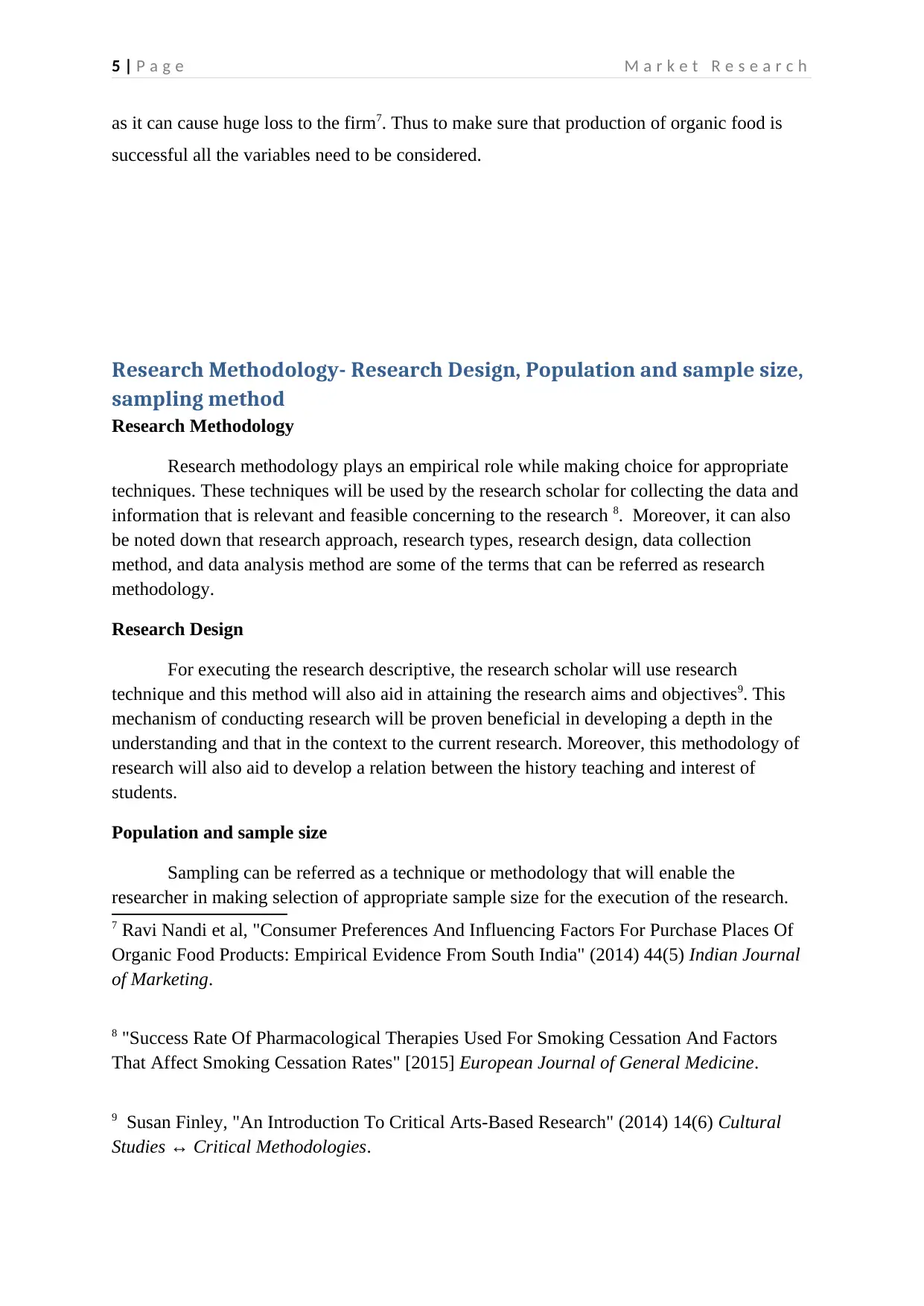
5 | P a g e M a r k e t R e s e a r c h
as it can cause huge loss to the firm7. Thus to make sure that production of organic food is
successful all the variables need to be considered.
Research Methodology- Research Design, Population and sample size,
sampling method
Research Methodology
Research methodology plays an empirical role while making choice for appropriate
techniques. These techniques will be used by the research scholar for collecting the data and
information that is relevant and feasible concerning to the research 8. Moreover, it can also
be noted down that research approach, research types, research design, data collection
method, and data analysis method are some of the terms that can be referred as research
methodology.
Research Design
For executing the research descriptive, the research scholar will use research
technique and this method will also aid in attaining the research aims and objectives9. This
mechanism of conducting research will be proven beneficial in developing a depth in the
understanding and that in the context to the current research. Moreover, this methodology of
research will also aid to develop a relation between the history teaching and interest of
students.
Population and sample size
Sampling can be referred as a technique or methodology that will enable the
researcher in making selection of appropriate sample size for the execution of the research.
7 Ravi Nandi et al, "Consumer Preferences And Influencing Factors For Purchase Places Of
Organic Food Products: Empirical Evidence From South India" (2014) 44(5) Indian Journal
of Marketing.
8 "Success Rate Of Pharmacological Therapies Used For Smoking Cessation And Factors
That Affect Smoking Cessation Rates" [2015] European Journal of General Medicine.
9 Susan Finley, "An Introduction To Critical Arts-Based Research" (2014) 14(6) Cultural
Studies ↔ Critical Methodologies.
as it can cause huge loss to the firm7. Thus to make sure that production of organic food is
successful all the variables need to be considered.
Research Methodology- Research Design, Population and sample size,
sampling method
Research Methodology
Research methodology plays an empirical role while making choice for appropriate
techniques. These techniques will be used by the research scholar for collecting the data and
information that is relevant and feasible concerning to the research 8. Moreover, it can also
be noted down that research approach, research types, research design, data collection
method, and data analysis method are some of the terms that can be referred as research
methodology.
Research Design
For executing the research descriptive, the research scholar will use research
technique and this method will also aid in attaining the research aims and objectives9. This
mechanism of conducting research will be proven beneficial in developing a depth in the
understanding and that in the context to the current research. Moreover, this methodology of
research will also aid to develop a relation between the history teaching and interest of
students.
Population and sample size
Sampling can be referred as a technique or methodology that will enable the
researcher in making selection of appropriate sample size for the execution of the research.
7 Ravi Nandi et al, "Consumer Preferences And Influencing Factors For Purchase Places Of
Organic Food Products: Empirical Evidence From South India" (2014) 44(5) Indian Journal
of Marketing.
8 "Success Rate Of Pharmacological Therapies Used For Smoking Cessation And Factors
That Affect Smoking Cessation Rates" [2015] European Journal of General Medicine.
9 Susan Finley, "An Introduction To Critical Arts-Based Research" (2014) 14(6) Cultural
Studies ↔ Critical Methodologies.
⊘ This is a preview!⊘
Do you want full access?
Subscribe today to unlock all pages.

Trusted by 1+ million students worldwide
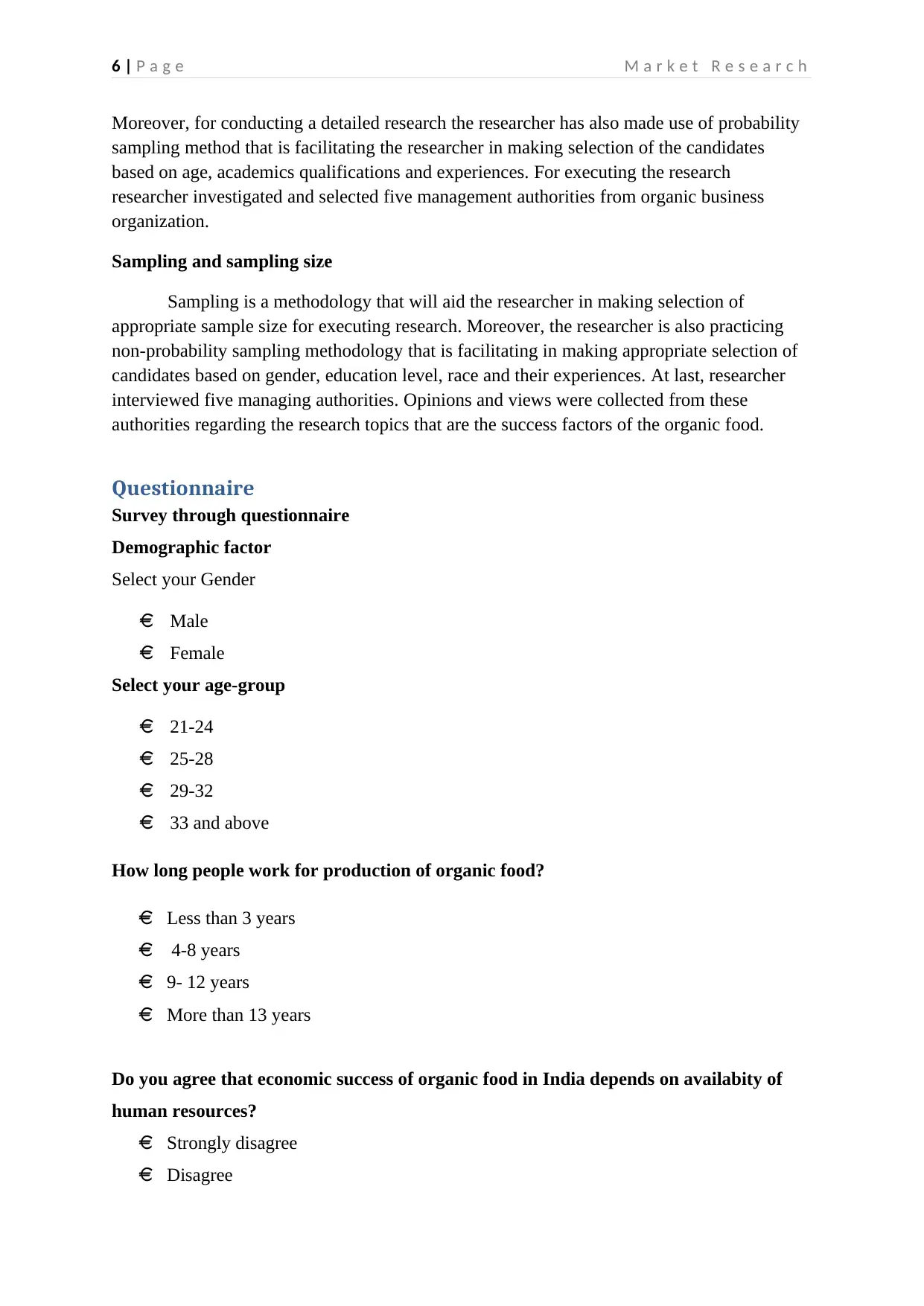
6 | P a g e M a r k e t R e s e a r c h
Moreover, for conducting a detailed research the researcher has also made use of probability
sampling method that is facilitating the researcher in making selection of the candidates
based on age, academics qualifications and experiences. For executing the research
researcher investigated and selected five management authorities from organic business
organization.
Sampling and sampling size
Sampling is a methodology that will aid the researcher in making selection of
appropriate sample size for executing research. Moreover, the researcher is also practicing
non-probability sampling methodology that is facilitating in making appropriate selection of
candidates based on gender, education level, race and their experiences. At last, researcher
interviewed five managing authorities. Opinions and views were collected from these
authorities regarding the research topics that are the success factors of the organic food.
Questionnaire
Survey through questionnaire
Demographic factor
Select your Gender
Male
Female
Select your age-group
21-24
25-28
29-32
33 and above
How long people work for production of organic food?
Less than 3 years
4-8 years
9- 12 years
More than 13 years
Do you agree that economic success of organic food in India depends on availabity of
human resources?
Strongly disagree
Disagree
Moreover, for conducting a detailed research the researcher has also made use of probability
sampling method that is facilitating the researcher in making selection of the candidates
based on age, academics qualifications and experiences. For executing the research
researcher investigated and selected five management authorities from organic business
organization.
Sampling and sampling size
Sampling is a methodology that will aid the researcher in making selection of
appropriate sample size for executing research. Moreover, the researcher is also practicing
non-probability sampling methodology that is facilitating in making appropriate selection of
candidates based on gender, education level, race and their experiences. At last, researcher
interviewed five managing authorities. Opinions and views were collected from these
authorities regarding the research topics that are the success factors of the organic food.
Questionnaire
Survey through questionnaire
Demographic factor
Select your Gender
Male
Female
Select your age-group
21-24
25-28
29-32
33 and above
How long people work for production of organic food?
Less than 3 years
4-8 years
9- 12 years
More than 13 years
Do you agree that economic success of organic food in India depends on availabity of
human resources?
Strongly disagree
Disagree
Paraphrase This Document
Need a fresh take? Get an instant paraphrase of this document with our AI Paraphraser
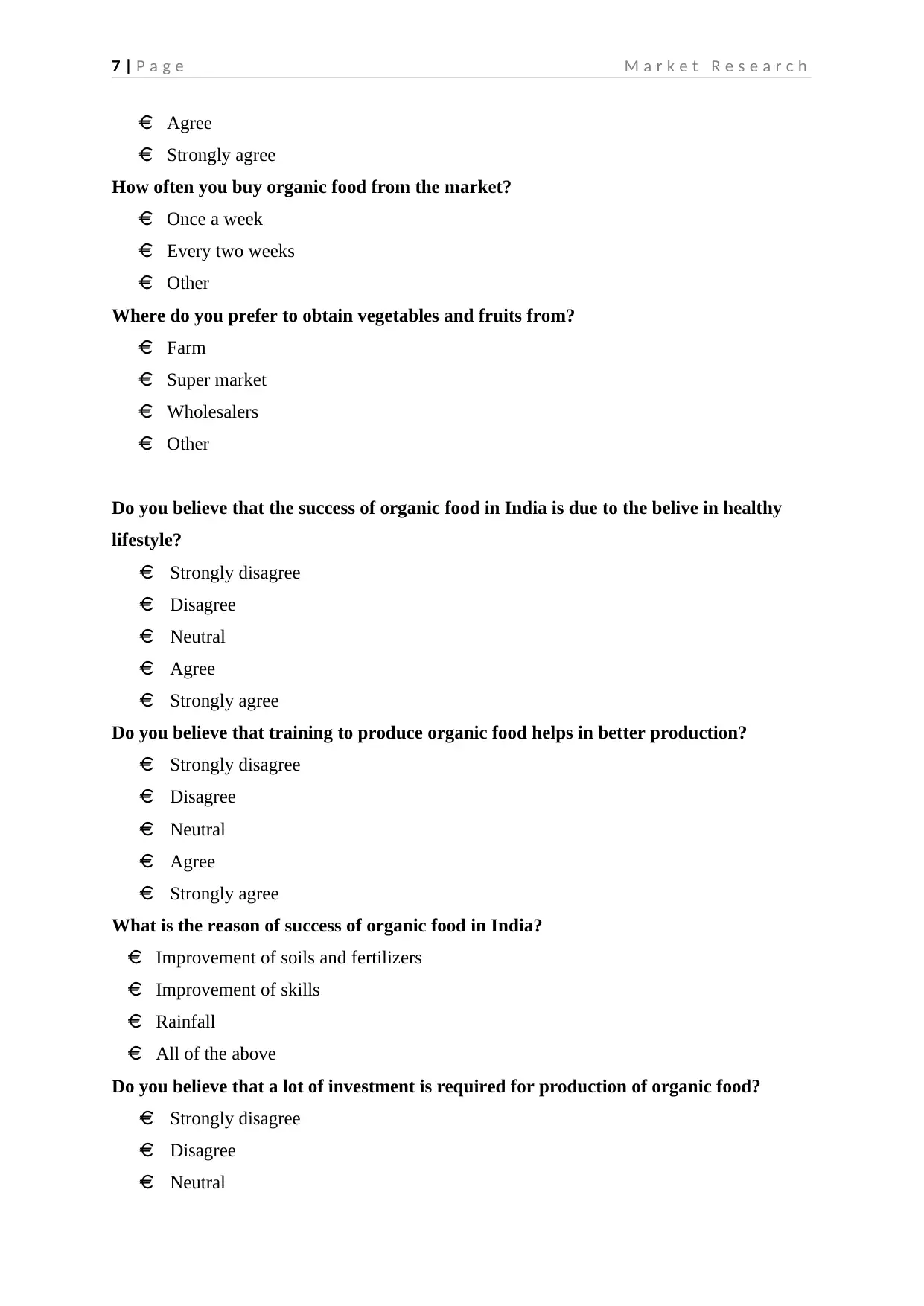
7 | P a g e M a r k e t R e s e a r c h
Agree
Strongly agree
How often you buy organic food from the market?
Once a week
Every two weeks
Other
Where do you prefer to obtain vegetables and fruits from?
Farm
Super market
Wholesalers
Other
Do you believe that the success of organic food in India is due to the belive in healthy
lifestyle?
Strongly disagree
Disagree
Neutral
Agree
Strongly agree
Do you believe that training to produce organic food helps in better production?
Strongly disagree
Disagree
Neutral
Agree
Strongly agree
What is the reason of success of organic food in India?
Improvement of soils and fertilizers
Improvement of skills
Rainfall
All of the above
Do you believe that a lot of investment is required for production of organic food?
Strongly disagree
Disagree
Neutral
Agree
Strongly agree
How often you buy organic food from the market?
Once a week
Every two weeks
Other
Where do you prefer to obtain vegetables and fruits from?
Farm
Super market
Wholesalers
Other
Do you believe that the success of organic food in India is due to the belive in healthy
lifestyle?
Strongly disagree
Disagree
Neutral
Agree
Strongly agree
Do you believe that training to produce organic food helps in better production?
Strongly disagree
Disagree
Neutral
Agree
Strongly agree
What is the reason of success of organic food in India?
Improvement of soils and fertilizers
Improvement of skills
Rainfall
All of the above
Do you believe that a lot of investment is required for production of organic food?
Strongly disagree
Disagree
Neutral
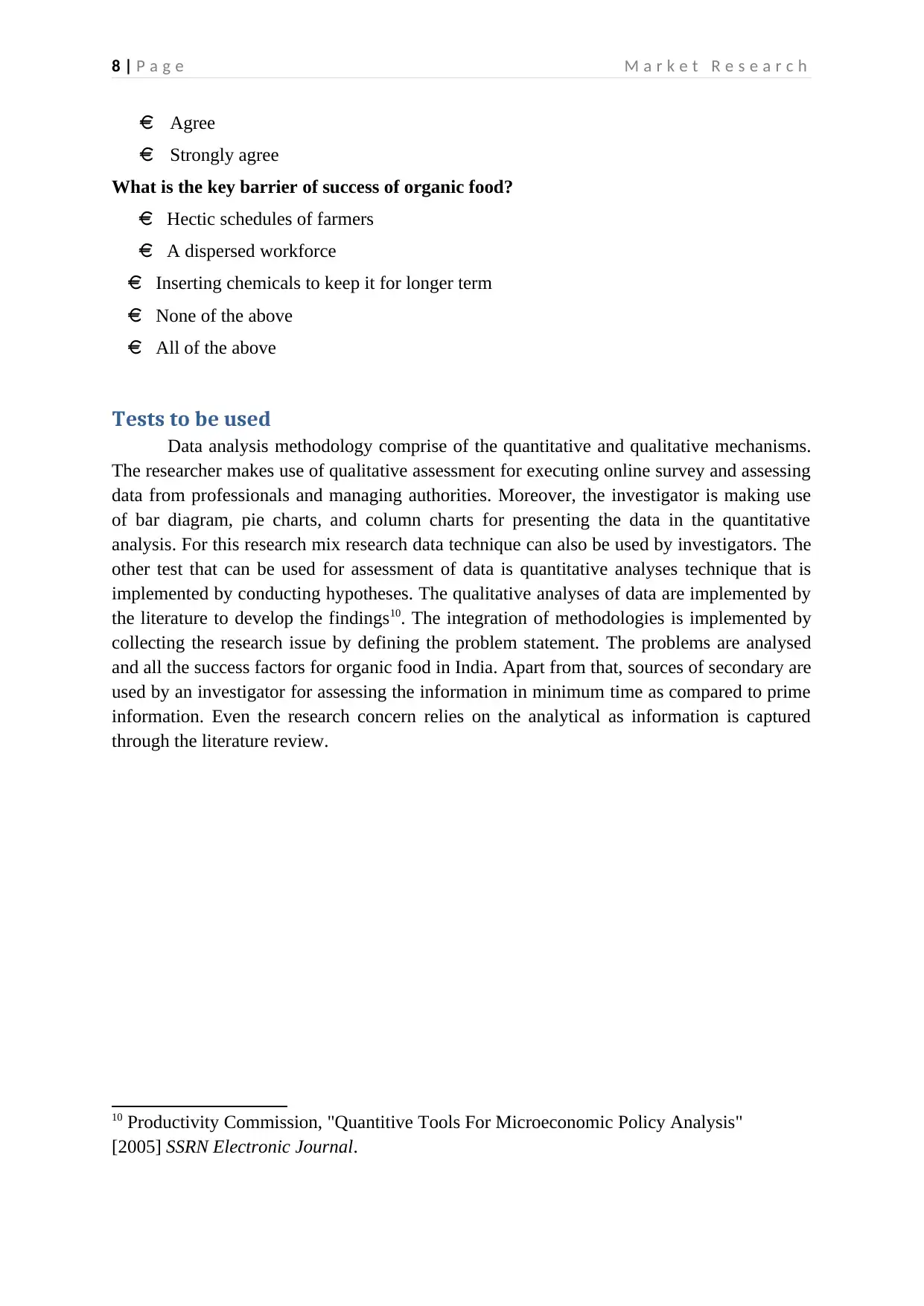
8 | P a g e M a r k e t R e s e a r c h
Agree
Strongly agree
What is the key barrier of success of organic food?
Hectic schedules of farmers
A dispersed workforce
Inserting chemicals to keep it for longer term
None of the above
All of the above
Tests to be used
Data analysis methodology comprise of the quantitative and qualitative mechanisms.
The researcher makes use of qualitative assessment for executing online survey and assessing
data from professionals and managing authorities. Moreover, the investigator is making use
of bar diagram, pie charts, and column charts for presenting the data in the quantitative
analysis. For this research mix research data technique can also be used by investigators. The
other test that can be used for assessment of data is quantitative analyses technique that is
implemented by conducting hypotheses. The qualitative analyses of data are implemented by
the literature to develop the findings10. The integration of methodologies is implemented by
collecting the research issue by defining the problem statement. The problems are analysed
and all the success factors for organic food in India. Apart from that, sources of secondary are
used by an investigator for assessing the information in minimum time as compared to prime
information. Even the research concern relies on the analytical as information is captured
through the literature review.
10 Productivity Commission, "Quantitive Tools For Microeconomic Policy Analysis"
[2005] SSRN Electronic Journal.
Agree
Strongly agree
What is the key barrier of success of organic food?
Hectic schedules of farmers
A dispersed workforce
Inserting chemicals to keep it for longer term
None of the above
All of the above
Tests to be used
Data analysis methodology comprise of the quantitative and qualitative mechanisms.
The researcher makes use of qualitative assessment for executing online survey and assessing
data from professionals and managing authorities. Moreover, the investigator is making use
of bar diagram, pie charts, and column charts for presenting the data in the quantitative
analysis. For this research mix research data technique can also be used by investigators. The
other test that can be used for assessment of data is quantitative analyses technique that is
implemented by conducting hypotheses. The qualitative analyses of data are implemented by
the literature to develop the findings10. The integration of methodologies is implemented by
collecting the research issue by defining the problem statement. The problems are analysed
and all the success factors for organic food in India. Apart from that, sources of secondary are
used by an investigator for assessing the information in minimum time as compared to prime
information. Even the research concern relies on the analytical as information is captured
through the literature review.
10 Productivity Commission, "Quantitive Tools For Microeconomic Policy Analysis"
[2005] SSRN Electronic Journal.
⊘ This is a preview!⊘
Do you want full access?
Subscribe today to unlock all pages.

Trusted by 1+ million students worldwide
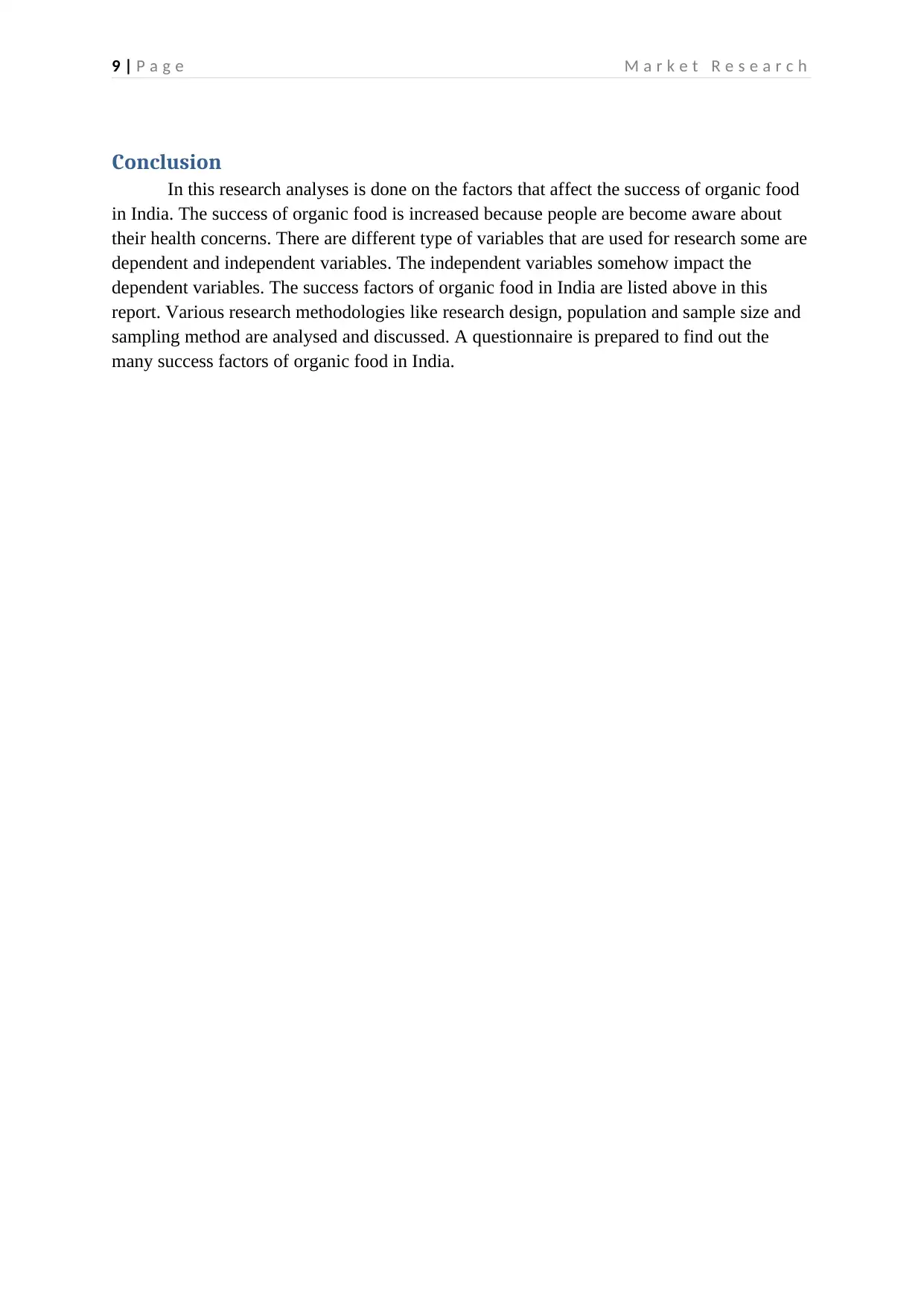
9 | P a g e M a r k e t R e s e a r c h
Conclusion
In this research analyses is done on the factors that affect the success of organic food
in India. The success of organic food is increased because people are become aware about
their health concerns. There are different type of variables that are used for research some are
dependent and independent variables. The independent variables somehow impact the
dependent variables. The success factors of organic food in India are listed above in this
report. Various research methodologies like research design, population and sample size and
sampling method are analysed and discussed. A questionnaire is prepared to find out the
many success factors of organic food in India.
Conclusion
In this research analyses is done on the factors that affect the success of organic food
in India. The success of organic food is increased because people are become aware about
their health concerns. There are different type of variables that are used for research some are
dependent and independent variables. The independent variables somehow impact the
dependent variables. The success factors of organic food in India are listed above in this
report. Various research methodologies like research design, population and sample size and
sampling method are analysed and discussed. A questionnaire is prepared to find out the
many success factors of organic food in India.
Paraphrase This Document
Need a fresh take? Get an instant paraphrase of this document with our AI Paraphraser
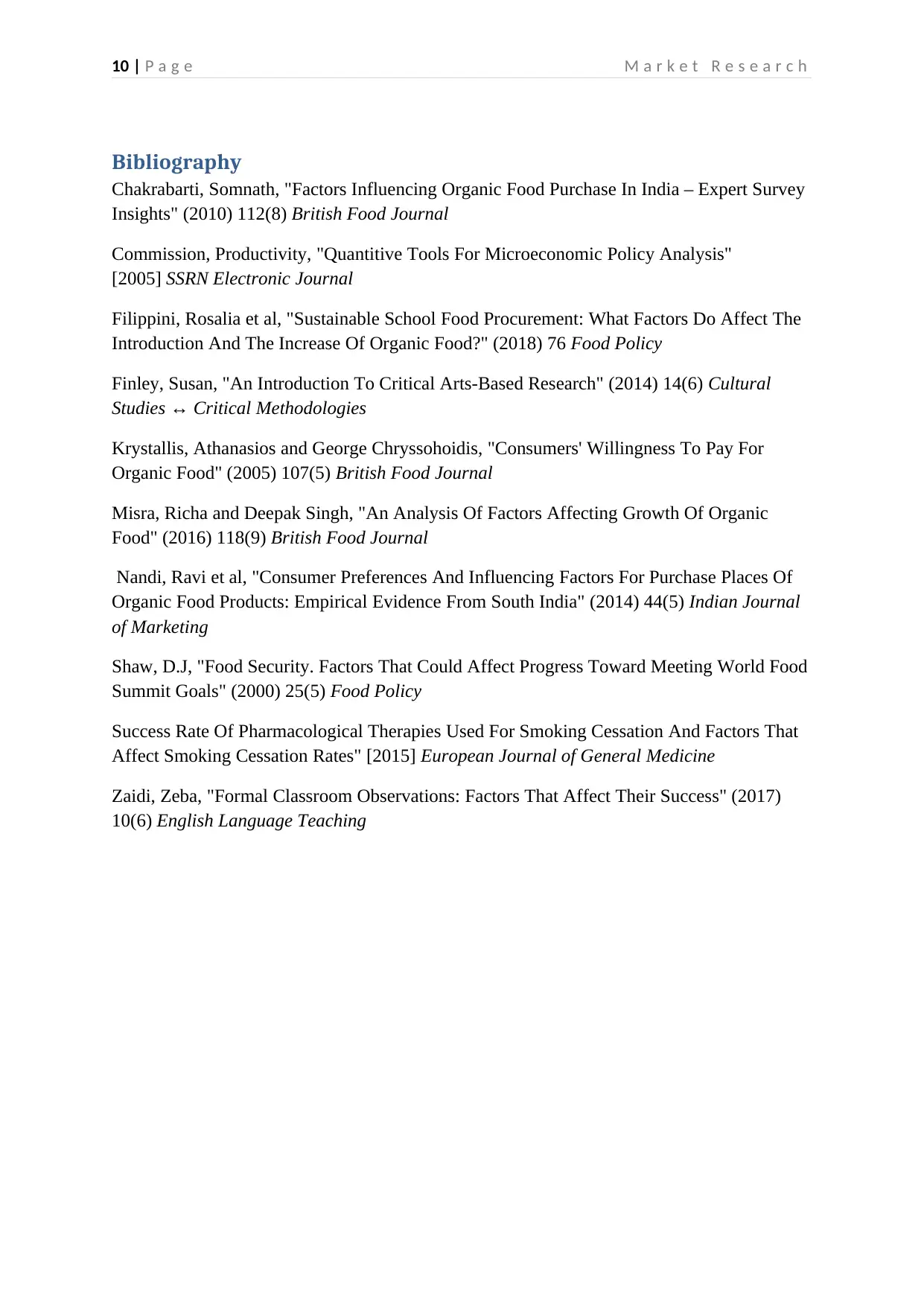
10 | P a g e M a r k e t R e s e a r c h
Bibliography
Chakrabarti, Somnath, "Factors Influencing Organic Food Purchase In India – Expert Survey
Insights" (2010) 112(8) British Food Journal
Commission, Productivity, "Quantitive Tools For Microeconomic Policy Analysis"
[2005] SSRN Electronic Journal
Filippini, Rosalia et al, "Sustainable School Food Procurement: What Factors Do Affect The
Introduction And The Increase Of Organic Food?" (2018) 76 Food Policy
Finley, Susan, "An Introduction To Critical Arts-Based Research" (2014) 14(6) Cultural
Studies ↔ Critical Methodologies
Krystallis, Athanasios and George Chryssohoidis, "Consumers' Willingness To Pay For
Organic Food" (2005) 107(5) British Food Journal
Misra, Richa and Deepak Singh, "An Analysis Of Factors Affecting Growth Of Organic
Food" (2016) 118(9) British Food Journal
Nandi, Ravi et al, "Consumer Preferences And Influencing Factors For Purchase Places Of
Organic Food Products: Empirical Evidence From South India" (2014) 44(5) Indian Journal
of Marketing
Shaw, D.J, "Food Security. Factors That Could Affect Progress Toward Meeting World Food
Summit Goals" (2000) 25(5) Food Policy
Success Rate Of Pharmacological Therapies Used For Smoking Cessation And Factors That
Affect Smoking Cessation Rates" [2015] European Journal of General Medicine
Zaidi, Zeba, "Formal Classroom Observations: Factors That Affect Their Success" (2017)
10(6) English Language Teaching
Bibliography
Chakrabarti, Somnath, "Factors Influencing Organic Food Purchase In India – Expert Survey
Insights" (2010) 112(8) British Food Journal
Commission, Productivity, "Quantitive Tools For Microeconomic Policy Analysis"
[2005] SSRN Electronic Journal
Filippini, Rosalia et al, "Sustainable School Food Procurement: What Factors Do Affect The
Introduction And The Increase Of Organic Food?" (2018) 76 Food Policy
Finley, Susan, "An Introduction To Critical Arts-Based Research" (2014) 14(6) Cultural
Studies ↔ Critical Methodologies
Krystallis, Athanasios and George Chryssohoidis, "Consumers' Willingness To Pay For
Organic Food" (2005) 107(5) British Food Journal
Misra, Richa and Deepak Singh, "An Analysis Of Factors Affecting Growth Of Organic
Food" (2016) 118(9) British Food Journal
Nandi, Ravi et al, "Consumer Preferences And Influencing Factors For Purchase Places Of
Organic Food Products: Empirical Evidence From South India" (2014) 44(5) Indian Journal
of Marketing
Shaw, D.J, "Food Security. Factors That Could Affect Progress Toward Meeting World Food
Summit Goals" (2000) 25(5) Food Policy
Success Rate Of Pharmacological Therapies Used For Smoking Cessation And Factors That
Affect Smoking Cessation Rates" [2015] European Journal of General Medicine
Zaidi, Zeba, "Formal Classroom Observations: Factors That Affect Their Success" (2017)
10(6) English Language Teaching
1 out of 11
Related Documents
Your All-in-One AI-Powered Toolkit for Academic Success.
+13062052269
info@desklib.com
Available 24*7 on WhatsApp / Email
![[object Object]](/_next/static/media/star-bottom.7253800d.svg)
Unlock your academic potential
Copyright © 2020–2025 A2Z Services. All Rights Reserved. Developed and managed by ZUCOL.





